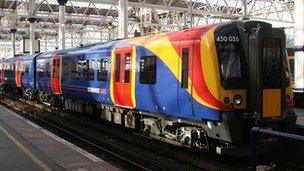Rail commuters face 6.5% fare rise
- Published

2013 will be the 10th consecutive year regulated fares have gone up by more than inflation in England
Some rail commuters in England will face a rise of almost 6.5% for their season tickets next year.
Fares in England, Scotland and Wales will go up by 4.2% on average. Last month, the PM intervened to limit average rises to 1% above inflation.
The biggest rise in 2013 would be 6.46% to £4,940 for an annual ticket from the Kent stations of Ramsgate, Dover Priory and Deal to London.
Passenger Focus said firms had showed restraint but there would be "pain".
The customer watchdog has highlighted a number of other fare increases itself, including a £272 - 5.9% - rise in the Canterbury to London annual ticket to £4,860 and the Bournemouth to London route - up £240 to £5,988.
And an annual ticket from Gloucester to Birmingham will cost an extra £140, it says.
In August, it had been announced that rail fares in England would rise by an average of 6.2%.
Passenger Focus researched the price rises using the Season ticket calculator, external on the National Rail Enquiries website, which has recently been updated with the new fares.
The Retail Prices Index (RPI) measure of inflation as of July 2012 - which stood at 3.2% - plus 3% was initially used to calculate the average rise.
But last month, David Cameron announced the average rise for the next two years would be capped at RPI plus 1%.
The figure for 2012 is therefore RPI as of July 2012 - 3.2% - plus 1%.
Train firms are able to raise some season tickets above 4.2% as long as the average increase is no more than that ceiling.
Some tickets will rise by as little as 2.3% while one ticket, from Shenfield, in Essex, to London will be £16 cheaper, at £2,704, a 0.6% drop.
'Welcome promise'
Rail Minister Norman Baker said the government had taken "pro-active steps" because family budgets were being squeezed.
"This decision puts an average of £45 per year back into the pockets of over a quarter of a million annual season ticket holders," he said.
Passenger Focus chief executive Anthony Smith said that, "after years of above-inflation fare rises, fresh increases are piling pressure on already high fares".
"The government and the rail industry must now work together to deliver on the welcome promise to get fare rises in line with inflation."
The Association of Train Operating Companies, meanwhile, said it was the government "not train companies that decides how much season tickets should rise on average each year".
"Successive governments have instructed train companies every year to increase these regulated fares on average by more than inflation." a spokesman said.
'Government collusion'
BBC transport correspondent Richard Westcott said 2013 would be the 10th consecutive year that regulated rail fares had gone up by more than inflation in England.
Regulated fares, which include season tickets and off-peak intercity journeys, make up half of all fares.
Consecutive rises had left the country with some of the most expensive trains in Europe, our correspondent said.
Manuel Cortes, leader of the TSSA rail union, said thousands of commuters across south-east England would be "paying more than £5,000 a year for their season tickets because of the government's unfair annual inflation-plus fare rises".
And RMT general secretary Bob Crow said train companies "with the collusion of the government, will be jacking up fares by up to 6% in the new year as they launch a full-frontal assault on passengers in the name of profit".
There are no fare increases currently planned in Northern Ireland after a 3% rise in April.
- Published7 October 2012
- Published13 August 2013
- Published20 August 2012
- Published14 August 2012